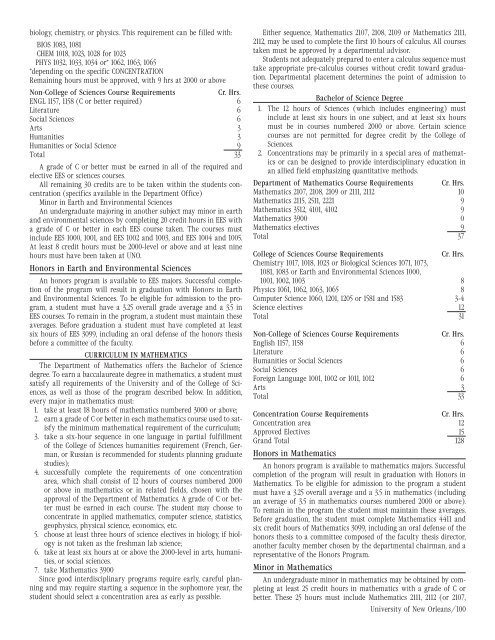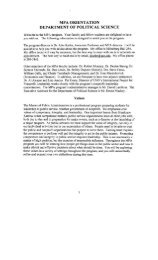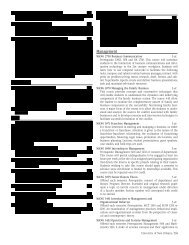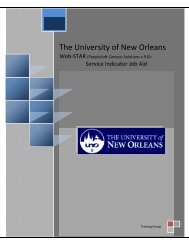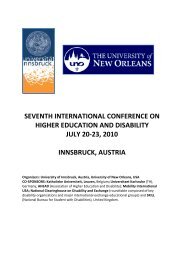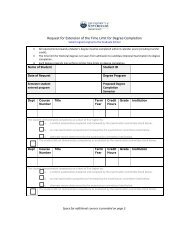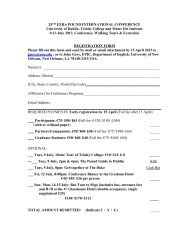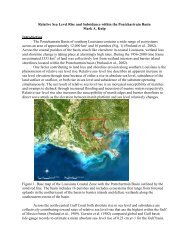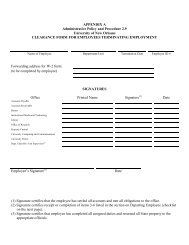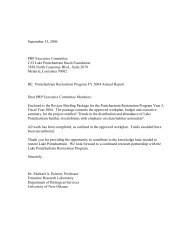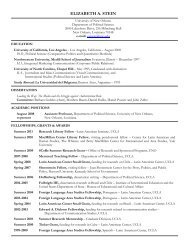Untitled - University of New Orleans
Untitled - University of New Orleans
Untitled - University of New Orleans
You also want an ePaper? Increase the reach of your titles
YUMPU automatically turns print PDFs into web optimized ePapers that Google loves.
iology, chemistry, or physics. This requirement can be filled with:<br />
BIOS 1083, 1081<br />
CHEM 1018, 1023, 1028 for 1023<br />
PHYS 1032, 1033, 1034 or* 1062, 1063, 1065<br />
*depending on the specific CONCENTRATION<br />
Remaining hours must be approved, with 9 hrs at 2000 or above<br />
Non-College <strong>of</strong> Sciences Course Requirements<br />
Cr. Hrs.<br />
ENGL 1157, 1158 (C or better required) 6<br />
Literature 6<br />
Social Sciences 6<br />
Arts 3<br />
Humanities 3<br />
Humanities or Social Science 9<br />
Total 33<br />
A grade <strong>of</strong> C or better must be earned in all <strong>of</strong> the required and<br />
elective EES or sciences courses.<br />
All remaining 30 credits are to be taken within the students concentration<br />
(specifics available in the Department Office)<br />
Minor in Earth and Environmental Sciences<br />
An undergraduate majoring in another subject may minor in earth<br />
and environmental sciences by completing 20 credit hours in EES with<br />
a grade <strong>of</strong> C or better in each EES course taken. The courses must<br />
include EES 1000, 1001, and EES 1002 and 1003, and EES 1004 and 1005.<br />
At least 8 credit hours must be 2000-level or above and at least nine<br />
hours must have been taken at UNO.<br />
Honors in Earth and Environmental Sciences<br />
An honors program is available to EES majors. Successful completion<br />
<strong>of</strong> the program will result in graduation with Honors in Earth<br />
and Environmental Sciences. To be eligible for admission to the program,<br />
a student must have a 3.25 overall grade average and a 3.5 in<br />
EES courses. To remain in the program, a student must maintain these<br />
averages. Before graduation a student must have completed at least<br />
six hours <strong>of</strong> EES 3099, including an oral defense <strong>of</strong> the honors thesis<br />
before a committee <strong>of</strong> the faculty.<br />
CURRICULUM IN MATHEMATICS<br />
The Department <strong>of</strong> Mathematics <strong>of</strong>fers the Bachelor <strong>of</strong> Science<br />
degree. To earn a baccalaureate degree in mathematics, a student must<br />
satisfy all requirements <strong>of</strong> the <strong>University</strong> and <strong>of</strong> the College <strong>of</strong> Sciences,<br />
as well as those <strong>of</strong> the program described below. In addition,<br />
every major in mathematics must:<br />
1. take at least 18 hours <strong>of</strong> mathematics numbered 3000 or above;<br />
2. earn a grade <strong>of</strong> C or better in each mathematics course used to satisfy<br />
the minimum mathematical requirement <strong>of</strong> the curriculum;<br />
3. take a six-hour sequence in one language in partial fulfillment<br />
<strong>of</strong> the College <strong>of</strong> Sciences humanities requirement (French, German,<br />
or Russian is recommended for students planning graduate<br />
studies);<br />
4. successfully complete the requirements <strong>of</strong> one concentration<br />
area, which shall consist <strong>of</strong> 12 hours <strong>of</strong> courses numbered 2000<br />
or above in mathematics or in related fields, chosen with the<br />
approval <strong>of</strong> the Department <strong>of</strong> Mathematics. A grade <strong>of</strong> C or better<br />
must be earned in each course. The student may choose to<br />
concentrate in applied mathematics, computer science, statistics,<br />
geophysics, physical science, economics, etc.<br />
5. choose at least three hours <strong>of</strong> science electives in biology, if biology<br />
is not taken as the freshman lab science;<br />
6. take at least six hours at or above the 2000-level in arts, humanities,<br />
or social sciences.<br />
7. take Mathematics 3900<br />
Since good interdisciplinary programs require early, careful planning<br />
and may require starting a sequence in the sophomore year, the<br />
student should select a concentration area as early as possible.<br />
Either sequence, Mathematics 2107, 2108, 2109 or Mathematics 2111,<br />
2112, may be used to complete the first 10 hours <strong>of</strong> calculus. All courses<br />
taken must be approved by a departmental advisor.<br />
Students not adequately prepared to enter a calculus sequence must<br />
take appropriate pre-calculus courses without credit toward graduation.<br />
Departmental placement determines the point <strong>of</strong> admission to<br />
these courses.<br />
Bachelor <strong>of</strong> Science Degree<br />
1. The 12 hours <strong>of</strong> Sciences (which includes engineering) must<br />
include at least six hours in one subject, and at least six hours<br />
must be in courses numbered 2000 or above. Certain science<br />
courses are not permitted for degree credit by the College <strong>of</strong><br />
Sciences.<br />
2. Concentrations may be primarily in a special area <strong>of</strong> mathematics<br />
or can be designed to provide interdisciplinary education in<br />
an allied field emphasizing quantitative methods.<br />
Department <strong>of</strong> Mathematics Course Requirements Cr. Hrs.<br />
Mathematics 2107, 2108, 2109 or 2111, 2112 10<br />
Mathematics 2115, 2511, 2221 9<br />
Mathematics 3512, 4101, 4102 9<br />
Mathematics 3900 0<br />
Mathematics electives 9<br />
Total 37<br />
College <strong>of</strong> Sciences Course Requirements<br />
Cr. Hrs.<br />
Chemistry 1017, 1018, 1023 or Biological Sciences 1071, 1073,<br />
1081, 1083 or Earth and Environmental Sciences 1000,<br />
1001, 1002, 1003 8<br />
Physics 1061, 1062, 1063, 1065 8<br />
Computer Science 1060, 1201, 1205 or 1581 and 1583 3-4<br />
Science electives 12<br />
Total 31<br />
Non-College <strong>of</strong> Sciences Course Requirements<br />
Cr. Hrs.<br />
English 1157, 1158 6<br />
Literature 6<br />
Humanities or Social Sciences 6<br />
Social Sciences 6<br />
Foreign Language 1001, 1002 or 1011, 1012 6<br />
Arts 3<br />
Total 33<br />
Concentration Course Requirements<br />
Cr. Hrs.<br />
Concentration area 12<br />
Approved Electives 15<br />
Grand Total 128<br />
Honors in Mathematics<br />
An honors program is available to mathematics majors. Successful<br />
completion <strong>of</strong> the program will result in graduation with Honors in<br />
Mathematics. To be eligible for admission to the program a student<br />
must have a 3.25 overall average and a 3.5 in mathematics (including<br />
an average <strong>of</strong> 3.5 in mathematics courses numbered 2000 or above).<br />
To remain in the program the student must maintain these averages.<br />
Before graduation, the student must complete Mathematics 4411 and<br />
six credit hours <strong>of</strong> Mathematics 3099, including an oral defense <strong>of</strong> the<br />
honors thesis to a committee composed <strong>of</strong> the faculty thesis director,<br />
another faculty member chosen by the departmental chairman, and a<br />
representative <strong>of</strong> the Honors Program.<br />
Minor in Mathematics<br />
An undergraduate minor in mathematics may be obtained by completing<br />
at least 25 credit hours in mathematics with a grade <strong>of</strong> C or<br />
better. These 25 hours must include Mathematics 2111, 2112 (or 2107,<br />
<strong>University</strong> <strong>of</strong> <strong>New</strong> <strong>Orleans</strong>/100


